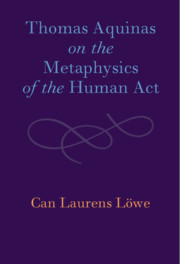Book contents
- Thomas Aquinas on the Metaphysics of the Human Act
- Thomas Aquinas on the Metaphysics of the Human Act
- Copyright page
- Dedication
- Contents
- Figures and Tables
- Acknowledgments
- Abbreviations
- Introduction
- Part I The General Framework
- Part II Choice Hylomorphism
- Chapter 2 Practical Judgment
- Chapter 3 The Judgment of Choice
- Chapter 4 Volition and Its Dependence on Judgment
- Chapter 5 Choice
- Part III Act Hylomorphism
- Appendix Judgment and Composition and Division
- Bibliography
- Index
Chapter 4 - Volition and Its Dependence on Judgment
from Part II - Choice Hylomorphism
Published online by Cambridge University Press: 25 June 2021
- Thomas Aquinas on the Metaphysics of the Human Act
- Thomas Aquinas on the Metaphysics of the Human Act
- Copyright page
- Dedication
- Contents
- Figures and Tables
- Acknowledgments
- Abbreviations
- Introduction
- Part I The General Framework
- Part II Choice Hylomorphism
- Chapter 2 Practical Judgment
- Chapter 3 The Judgment of Choice
- Chapter 4 Volition and Its Dependence on Judgment
- Chapter 5 Choice
- Part III Act Hylomorphism
- Appendix Judgment and Composition and Division
- Bibliography
- Index
Summary
Having examined the judgment crucial to the hylomorphically structured act of choice, this chapter turns to the act of choice itself, which is a volition. It does not yet offer an account of choice’s hylomorphic structure but lays important groundwork for doing so in Chapter 5 by shedding light on Aquinas’s general account of volition and its dependence on judgment. It first argues that a volition differs from judgment because it involves a world-to-mind rather than mind-to-world direction of fit. It then examines how volition depends on judgment. Aquinas himself characterizes judgment as the formal as well as the final cause of volition. The chapter suggests that these are two descriptions of one and the same dependence relation: judgment orders volition to an end, which makes it a final cause, and in so doing it also determines the volition’s kind, which makes it a formal cause. The last two sections deal with Aquinas’s view that the will “moves itself.” They argue that this does not imply any freedom of the will to operate independently of reason. In short, the chapter advocates a strongly intellectualist account of the will’s freedom.
Keywords
- Type
- Chapter
- Information
- Thomas Aquinas on the Metaphysics of the Human Act , pp. 74 - 99Publisher: Cambridge University PressPrint publication year: 2021

